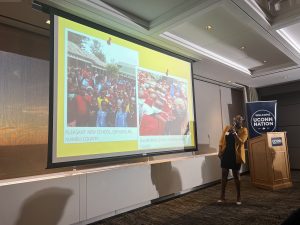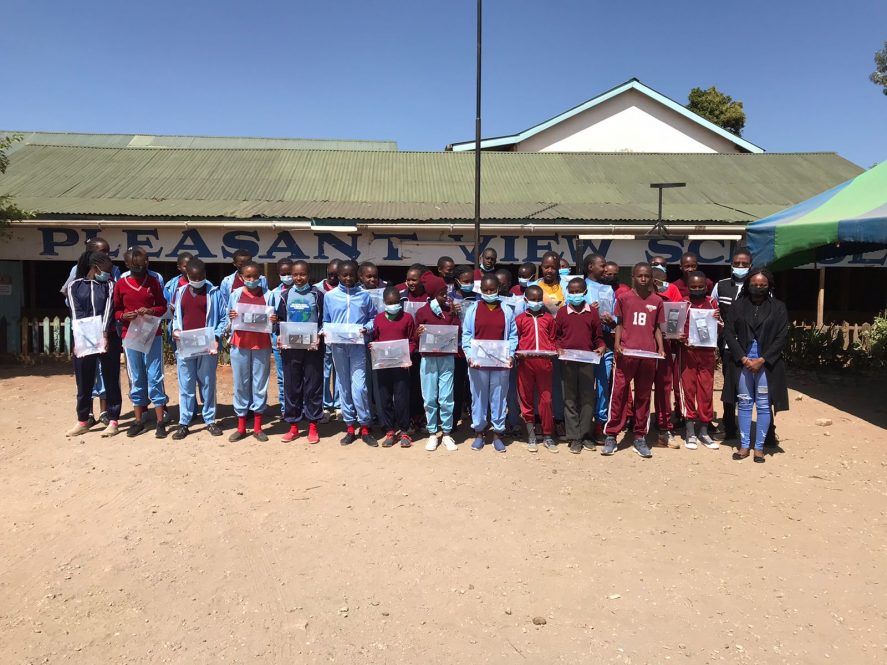Nicole Muthoni ’23 (CLAS) grew up in Nairobi, the capital city of Kenya. But when she returned to Kenya this past February, it wasn’t for a homecoming.
Instead of spending a month in the country’s modern capital, she spent much of her time about an hour and a half to its north, in Githunguri – a farming community of less than 17,000 people in Kiambu County, the second most populous county in Kenya.
Rather than glass-walled skyscrapers on manicured city streets, Githunguri’s landscape is peppered with agricultural fields and houses made of stone. Within the small community is a school – the Pleasant View School – where the girls wear dresses with white collars, and the boys wear red or gingham shirts, and the teachers still write their lessons in chalk on large blackboards at the front of small classrooms.
What you don’t see much of in the Pleasant View School’s classrooms is technology.

In this part of Kenya, computers are hard to come by, and those that do arrive are often older or refurbished, close to the end of their usable life and far from cutting edge. When newer technologies are brought to the community, the lack of infrastructure to support them quickly becomes apparent.
“A lot of Western companies are bringing computer technology to schools in Kenya, which is amazing,” says Muthoni. “But then they forget that there is this infrastructure deficit in the rural communities. They can house computers, but they won’t have access to Wi-Fi, or they won’t have access to power, so these computers are rendered useless.”
This lack of accessibility for the young students at Pleasant View School means that they often struggle to keep up with an increasingly digital world. When the coronavirus pandemic began to spread across the globe in 2020, schools in Githunguri were not immune to the disruption of regular in-person classroom learning – but the community’s infrastructure deficit made virtual learning virtually impossible.
“During COVID, one year was lost,” says Muthoni, “because the majority of the students were not able to engage with virtual learning due to the lack of technology, and even due to the lack of network systems, especially in rural Kenya.”
In the midst of the pandemic as well, and half a world away, Muthoni – like so many students in Western countries – had also found herself struggling with virtual learning, albeit in ways far different from her family in Kenya. In search of a university with stronger research opportunities, she had just transferred to UConn in the fall of 2020 as a sophomore to study psychology when the logistics of learning changed dramatically.
The daughter of a scholar, she was committed to becoming a scholar herself and wanted to focus on infant and child research. It wasn’t an easy time, she says, but as she worked with support systems and mentors at UConn to overcome her own pandemic learning challenges, the challenges she knew her young cousins were facing in her home country became the impetus of an idea.
“I remember talking to a professor and telling him about some of the pains that were going on during the time of online learning and how some students in Kenya were really falling behind, and my professor was trying to see if he could have a paper on this one year that students learned virtually and how it affected learning outcomes in students,” she says. “That’s the time I thought about starting PazaTech.”
In Swahili, the word “paza” means “amplify,” and it’s not just the namesake of the startup nonprofit organization that Muthoni co-founded as an undergraduate at UConn. It’s also the organization’s mission.
“PazaTech’s main aim is the amplification and the usability of technology in rural Kenya, especially in underserved communities — our main aim is to generally create a pipeline of young tech-savvy learners who are able to engage with technology, are competent for the digital world, and are prepared for the future of work,” Muthoni explains, and she has developed an ambitious agenda toward accomplishing that goal.
PazaTech is working to bring edge computing technology into schools in rural Kenya, relying on gamified learning systems and developing optimized curriculum to enhance literacy and numeracy skills in elementary-age students.
“This is edge computing software that doesn’t have to rely on Wi-Fi, because the majority of the schools we are targeting in Kenya don’t have network systems,” Muthoni explains.
The startup is also identifying areas for teacher training in rural communities in Kenya, working to build a mobile technology learning center in a bus that could house technology systems and move from school-to-school across the countryside offering programs, and bringing in new physical devices for students to learn with, like state-of-the-art tablets and laptops.
PazaTech is also hoping to partner with organizations that provide nutrition assistance in underserved schools, a need Muthoni identified during her month in Kenya this year.
“I conducted customer discovery, going from school to school, signing letters of intent with the school heads, and trying to see what really the pain point in these schools is,” she says. “In some of the schools, they said that technology is a very secondary need. Yes, it’s awesome. It will put us in a global sphere, where our aim is to have students compete fairly in the corporate economy. But right now, we need basics. We need food, we need water. These are the basic things we need, because if you bring kids to a classroom and they’re hungry, even though you have technology, it won’t make any difference.”
In pursuit of PazaTech, Muthoni has taken full advantage of the host of opportunities available to student entrepreneurs at UConn. She first pitched PazaTech at Innovation Quest (iQ), a competition designed to provide graduate and undergraduate students an opportunity to chase after a budding idea.
“When I did iQ for the first time, it really opened my eyes to a different world of entrepreneurship, like pitching and pitching in front of judges,” Muthoni says. “It was like, wow, I could see a future in this.”

She didn’t win at Innovation Quest, but she didn’t slow down, either. She took her idea to other forums, like the Connecticut Center for Entrepreneurship and Innovation’s Get Seeded program, and later joined Traction at CCEI, which helps student entrepreneurs further develop their own skills as they work on validating their startup concept.
“All of these programs have really opened my mind when it comes to entrepreneurship and understanding the entrepreneurial journey,” she says, “and I think one of the key things that I’ve really learned is to love the problem. Be in love with a problem. Because that’s the only way you can understand the solution.”
Muthoni also became affiliated with the Werth Institute for Entrepreneurship and Innovation, and took a gap year in the 2022-23 academic year to join the second cohort of the Stamford Startup Studio, where she connected with a venture coach and served as the cohort’s team lead – working with the studio’s entrepreneurship fellow to develop his own ed-tech concept and finding ways to also collaborate on educational opportunities in Kenya.
“What the Stamford Startup Studio has really helped me with is to have this gap year to really work on my venture,” Muthoni explains, “but to also really see and be an apprentice for another startup that is way ahead of me and learn from them.”
She adds, “I can say that it was a blessing coming to UConn, because UConn has so many entrepreneurial programs that I have delved myself into.”
What she’s also found from the programs at CCEI and from pitching at Innovation Quest is a deep interest in someday working in venture capital and finding a place at the table for people who don’t fit inside the traditional mold of what an investor might look like.
“At the top, the higher you go, the smaller the niche, and the majority of these spaces are predominantly white,” Muthoni says. “We don’t have people who look like me who are in spaces like those, as angel investors or venture capitalists. I’ve been really thinking a lot about going into that space, or being a VC or an angel investor, and so starting to streamline myself into such spaces and seeing how, in the future, I can sit in that chair and see someone else who looks like me, pitching an idea.”
Muthoni still finds ways to take time for herself – she doesn’t work on Sundays, and she loves to cook.
And while there’s a lot of moving parts in her startup that still keep her on her toes, she says that for her, being an entrepreneur means honing in on her life’s mission and making it her purpose.
“I feel like sometimes we have to step back and be spectators in our own life,” she says. “I’m not saying that just being in this space of entrepreneurship has been easy. I’ve been rejected a lot. But my mindset is that rejection is redirection. Just because you’ve been rejected doesn’t mean that you’re a failure. You can continue seeing different things and different opportunities.
“It’s never going to be easy and perfect. But also, at the same time, don’t worry. Everything that is happening is conspiring to happen for the best, for your best.”



